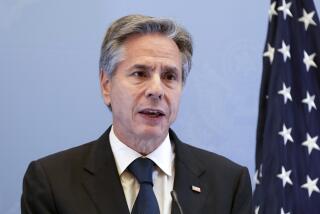Both sides in Iran nuclear talks make concessions to extend deadline
Iran and six world powers agreed late Friday to extend their talks on Tehran’s nuclear program for four months, insisting that they have made progress toward a historic deal despite disagreements.
Representatives of the seven countries have conferred almost daily since February to try to reach an agreement that would prevent Iran from gaining nuclear weapons capability, and in exchange would provide it relief from tough sanctions on its economy.
Negotiators agreed to extend most of the features of an interim deal the countries signed in November. They also agreed to give Iran access to $2.8 billion in Iranian funds that have been frozen abroad under sanctions and added further restrictions to Iran’s nuclear program.
In two weeks of intensive talks in Vienna this month, Iran and the six powers — the United States, France, Britain, Germany, Russia and China — have fallen short of meeting a Sunday deadline for an agreement. But President Obama and Iranian Foreign Minister Mohammad Javad Zarif said this week that negotiators had made enough progress to justify four more months of discussions.
In a joint statement, the seven countries said that “while we have made tangible progress on some of the issues ... there are still significant gaps on some core issues which require more time and effort.”
The extension is not expected to be strongly challenged by skeptics in Congress or hard-liners in Tehran.
The Israeli government, which fears that Iran will build a bomb and was deeply skeptical of the interim agreement that began the talks, has told the Obama administration that it favors an extension of the deadline, a senior administration official said.
U.S. officials listed, though not in much detail, areas in which the two sides have made progress.
They have moved closer to agreement on how to restrict the operations of a heavy-water reactor at Arak, which the six countries worry could provide a pathway to a bomb using plutonium as fuel.
The parties have made some headway in trying to find a new purpose for a deeply buried enrichment facility at Fordow, which the world powers suspect would be impervious to a bomb attack.
They have reduced their differences on how world powers monitor the nuclear program and how they will keep Iran from converting its low-enriched uranium to higher-enriched material more suitable for a bomb.
Under the new deal, Iran has agreed to further restrict its stockpile of 20% enriched uranium, material that is a special worry because it easily can be converted to material usable as bomb fuel. The deal provides that before Nov. 24, the material must be made into fuel for an Iranian research reactor, which will make it difficult to ever use as bomb fuel.
In a statement, Secretary of State John F. Kerry acknowledged that negotiators remain far apart on the core issue of restricting Iran’s enrichment capacity, including its inventory of centrifuges, the machines that produce the material. Iran is demanding to keep operating its current inventory of about 10,000; the six other countries are demanding that the number be reduced by thousands.
The two sides face a challenge in trying to explain what happened in the talks, and how they intend to overcome it by the fall.
“They’ve got to explain what will change in the next four months that will make a deal possible, when they couldn’t get one so far this year,” said Ray Takeyh, an Iran specialist at the Council on Foreign Relations.
But neither side has wanted the talks to collapse, which could open the way for Iran to fully resume its nuclear activities. That would again raise the issue of whether military action is needed to stop it from gaining the capability to build a nuclear bomb.
------------
1 a.m. update:
By setting the deadline in November, the deal assures that when the final agreement is reached, the Democrats will remain in control of the Senate, even if the Republicans have won a midterm victory. That is likely to give President Obama more leeway to begin suspending sanctions as implementation of the deal gets underway. Republicans have been more reluctant to lift the economic penalties.
------------
Twitter: @richtpau
More to Read
Start your day right
Sign up for Essential California for news, features and recommendations from the L.A. Times and beyond in your inbox six days a week.
You may occasionally receive promotional content from the Los Angeles Times.







